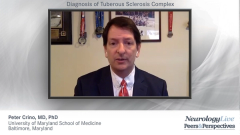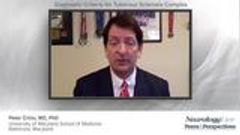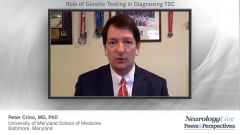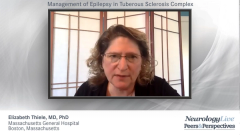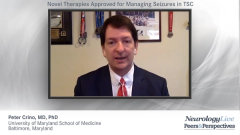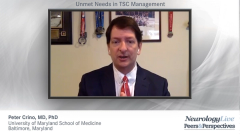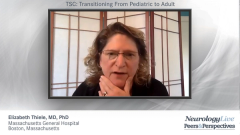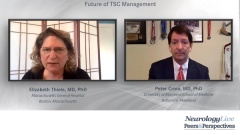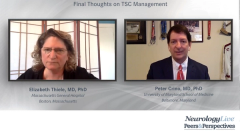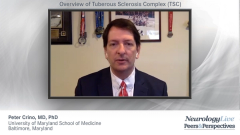
Overview of Tuberous Sclerosis Complex (TSC)
Elizabeth Thiele, MD, PhD, and Peter Crino, MD, PhD, define tuberous sclerosis complex (TSC) including the neurobehavioral manifestations of disease.
Episodes in this series

Elizabeth Thiele, MD, PhD: Hello, and thank you for joining this Neurology Live® Peers & Perspectives® presentation titled, “Management of Tuberous Sclerosis Complex.” Today we’re going to discuss a number of topics pertaining to the diagnosis and management of tuberous sclerosis complex [TSC]. I’m Dr Elizabeth Thiele, the director of the pediatric epilepsy program and the director of the Carol and James Herscot Center for Tuberous Sclerosis Complex at Massachusetts General Hospital, and a professor of neurology at Harvard Medical School in Boston, Massachusetts. Joining me today is Dr Peter Crino, the chairman and a professor of neurology at the University of Maryland School of Medicine, and the chair of the board of the Tuberous Sclerosis Alliance. Thank you so much for joining us. Let’s begin.
Peter Crino, MD, PhD: Thanks, Elizabeth.
Elizabeth Thiele, MD, PhD: Pete, you and I have spent most of our careers thinking about and taking care of people with TS [tuberous sclerosis]. In a nutshell, if you were talking to a new patient or a colleague, how would you explain tuberous sclerosis complex? What causes it? What’s the prevalence? How is it inherited?
Peter Crino, MD, PhD: Elizabeth, thanks for having me on to chat about TSC. Tuberous sclerosis complex is a multisystem disorder, which means that it affects multiple organ systems in the body. It’s a genetic disorder, which means it’s caused by mutations in genes in the body. We know these 2 genes. One is called TSC1, and 1 is called TSC2. Tuberous sclerosis complex can occur as an autosomal-dominant inherited disorder, which means that there may be multiple family members who have tuberous sclerosis [TS], and the gene mutations have been passed through family lineage. However, it can also occur as a so-called sporadic disorder, which is that a new mutation can just occur, and a person can be the first in their family who has this diagnosis. Tuberous sclerosis complex can affect multiple organ systems—really, any organ system, but there are a few that really stand out. I suspect we’ll talk more about that shortly, including the brain, eyes, heart, kidney, lungs, and skin.
Elizabeth Thiele, MD, PhD: Pete, 1 of the things that’s always interested me about TSC is the multiorgan system involvement. As a neurologist, we learn about kidney and lung and skin and TS and how that helps inform us about the brain. One of the really exciting developments over the past 5 to 10 years has been the focus on the neurobehavioral aspects of TS, now with the acronym TSC-associated neuropsychiatric disorder [TAND]. Particularly when I started taking care of adults with TS, I realized how incredibly difficult those symptoms were for patients living with TSC. It’s been great that there has been more attention to that with a diagnosis treatment, and there’s definitely a need for more research to be done. In your experience, what are the main issues your patients experience with TAND?
Peter Crino, MD, PhD: That’s a great question. My practice is largely an adult practice, as well as a transition practice from pediatrics to adults. I see teenagers down to age 14 and all the way up. My oldest patient with TSC is his mid-60s and is doing well. The challenges that children see with tuberous sclerosis, many will carry forward into adult life. Some change and disappear, but some new challenges also appear as people get into adolescence and into adult years. TAND, which is the umbrella term for the neurobehavioral manifestation in TSC, including autism spectrum disorder, anxiety, intellectual disability, and sleep disorders—a whole panoply of challenges that often persist into adulthood. Amazingly, because of the demands in adult life with schooling and employment and other responsibilities, often it eclipses some of the other challenges in TSC. I spend a lot of time in visits with patients talking about—in addition to seizures and lung disease and kidney disease—social relationships, employment, jobs, anxiety levels, obsessive compulsive behaviors, stereotypical behaviors, intermittent outbursts or emotionality and emotional ability, and how these factor into effective and functional interactions with members of the family, or in the job or school setting, group-home setting, or wherever.
Elizabeth Thiele, MD, PhD: I agree. As you know, I take care of both kids and adults with TS. When I’m seeing new adults, we bring up the aspects, particularly the anxiety that so many people with TS have. It’s amazing how many of them have had significant anxieties all their life, even before they ever heard of the disorder tuberous sclerosis complex, and how many of them have never been treated or diagnosed with those.
Peter Crino, MD, PhD: That’s correct.
Elizabeth Thiele, MD, PhD: I’ve had people start crying in the office when I’m describing these mental health issues. I’ll say, “Oh, my gosh. I’m so sorry. Are you OK?” I remember 1 woman very clearly was looking and saying, “No, you’re describing me. You’re completely describing me.” It’s important to understand, ask, and address the TAND checklist that was developed. It was quite useful as a tool to screen. For many people I’m seeing, no one has ever asked about those aspects of having TSC.
Peter Crino, MD, PhD: That’s correct.
Elizabeth Thiele, MD, PhD: Many people would say, “You’d be anxious if you have tuberous sclerosis too,” but it isn’t that. It often precedes them even knowing they have this disorder.
I’d like to thank the audience for watching this Neurology Live® webinar. If you enjoyed the content, please subscribe to our e-newsletters to receive upcoming programs and other great content right in your in-box.
Transcript Edited for Clarity
Newsletter
Keep your finger on the pulse of neurology—subscribe to NeurologyLive for expert interviews, new data, and breakthrough treatment updates.

